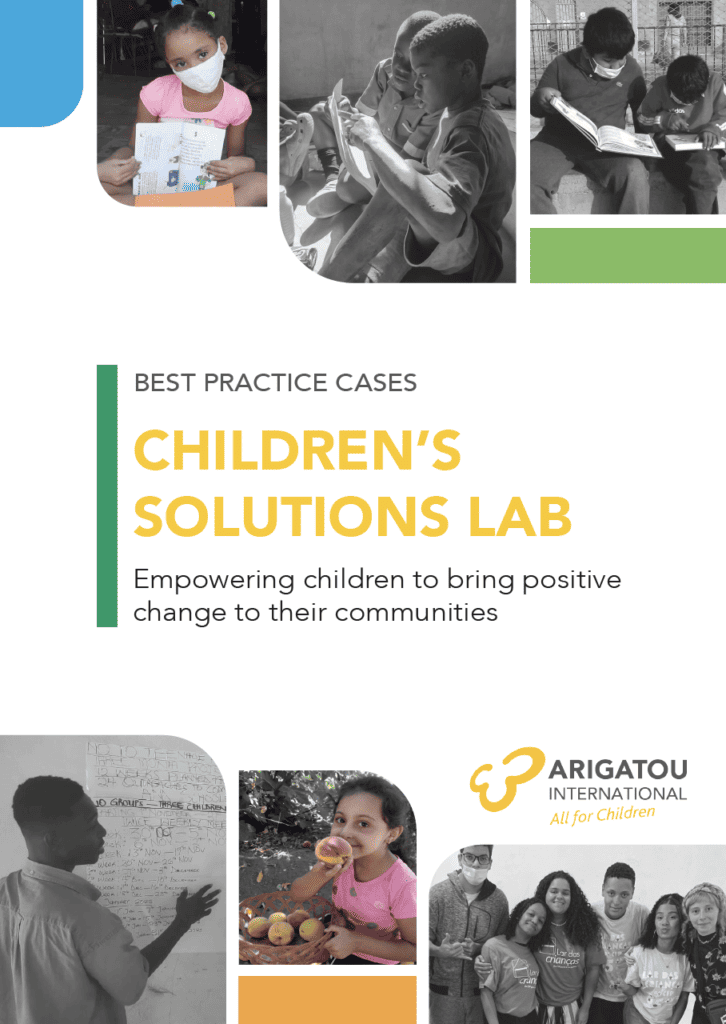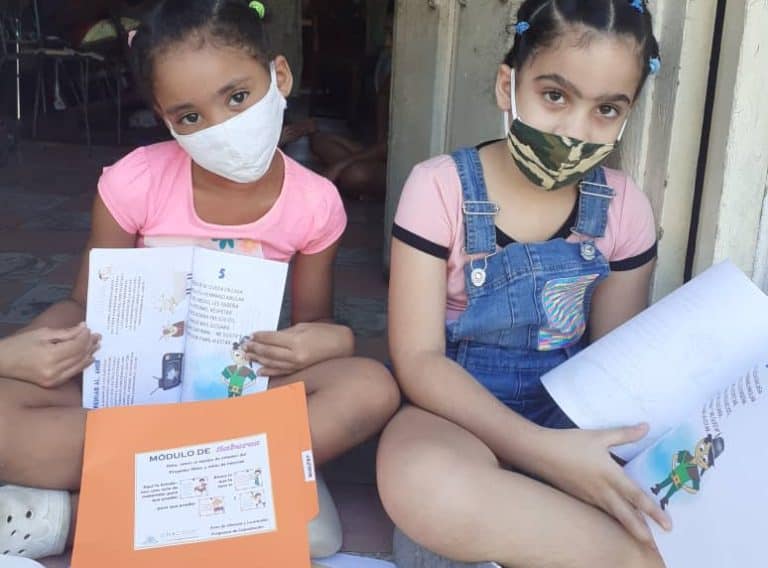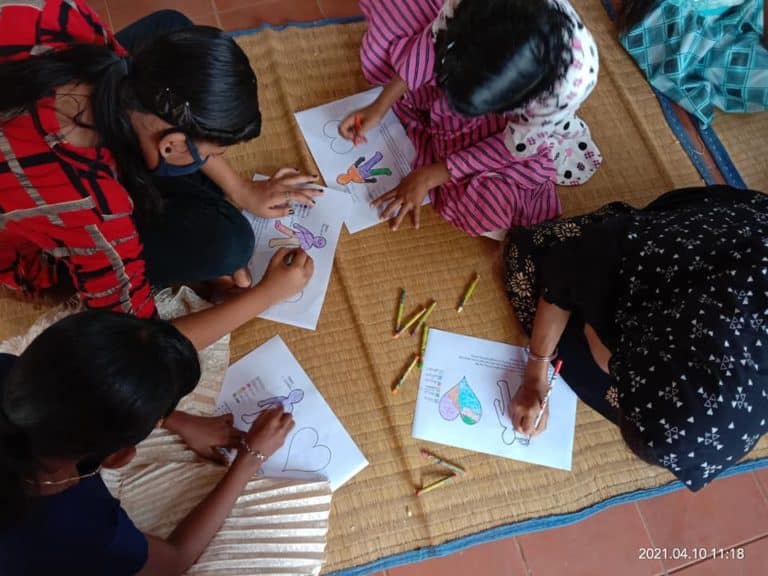Children’s Solutions Lab
Share
Tweet
Email
The Children’s Solutions Lab (CLS) program aimed at empowering children to bring positive contributions to their communities by addressing child poverty around them and engaging in ethical reflections about the roots of social conflicts and how some cultural norms can potentially impact the well-being of children and contribute to child poverty.
The CSL aimed at promoting and supporting projects genuinely led by children and assist adults who work with children in understanding what genuine participation entails and how to engage young people respectfully, meaningfully, and safely.
Through an open call for applications, groups of children around the world were invited to submit projects led by them that could propose context-sensitive and unique solutions to poverty affecting children in their communities. The selected groups received technical support and small-scale funding to implement their projects.

Best Practices Cases
Discover the transformative journeys of children from 10 countries as they implemented their unique projects to bring positive changes to their communities through the support of our Children’s Solutions Lab Program.
Frequently Asked Questions
What is the Children’s Solutions Lab?
The Children’s Solutions Lab (CSL) is a process initiated by Arigatou International, to support children in taking action towards overcoming poverty that affects children in their communities, through solutions based on ethics education.
The Children’s Solutions Lab (CSL) seeks to promote ethical reflections among children about the root causes of poverty and how some social and cultural norms can impact the wellbeing of children and, ultimately, lead to child poverty. We aim to support children in finding local solutions to address these issues in their communities.
The Children’s Solutions Lab (CSL) aims to encourage children to participate in transforming their communities and to empower children.
Child-led is when a child chooses the activity/project/action rather than the adult. The child has control of the activity, but the adult accompanies the process to ensure it is safe and meaningful.
The main criteria to get selected for one of the CSL micro-grants is that the submitted project is genuinely conceived, developed, led, and eventually implemented by children (persons below 18 years of age).
Adults are expected to support the children’s group during the planning and application processes, and eventually during the implementation.
Together with a micro-grant, the selected groups of children will also receive support and mentoring from Arigatou International during the implementation.
What does ethics education mean?
Ethics education is an approach towards promoting positive values on children, young people, and the larger society towards creating a world of greater justice, peace, and dignity.
Arigatou International’s approach to ethics education envisions a world where children are equipped to make ethical decisions, nurture their spirituality, and transform their communities together, based on values that promote empathy, respect, responsibility, and reconciliation.
For the Children’s Solutions Lab (CSL), the ethics education approach aims to promote critical thinking among children about the social and cultural norms that can lead to poverty, and collective actions to find solutions to tackle these issues.
The Children’s Solutions Lab (CSL) also encourages interfaith and intercultural collaboration, whereby children from different walks of life work together to develop solutions that can positively transform their communities.
When does the Children’s Solutions Lab take place and how long is the process?
The call for applications for the Children Solutions Lab (CSL) will be launched by the end of February 2022 and will remain open until March 31, 2022. Selected projects will be announced in April and children’s groups will have six months to implement their solutions, starting from the day they receive their funds. The projects must be fully completed before the end of 2022.
Where does the Children’s Solutions Lab take place?
We encourage children to develop local community solutions. Therefore, the Children’s Solutions Lab (CSL) processes take place in the children’s respective communities – be it at their schools, social clubs, places of worship and other such safe spaces.
Children’s Solutions Lab events can be organized virtually (online) or in-person, depending on the needs and resources available. In all sessions, the wellbeing of the participating children should be ensured, including their safety, comfort, and meaningful participation.
Arigatou International encourages children from all walks of life, different cultural and religious backgrounds, and different geographical locations, to participate in the Children’s Solutions Lab (CSL).
The 2020/ 2021 Children’s Solutions Lab (CSL) had more than 1,200 children from 37 children’s groups in 23 countries participating. In 2020, the five CSL micro-grants were given to children’s groups from Cuba, India, Kenya, Peru, and Serbia.
Who can take part in the Children’s Solutions Lab?
The Children’s Solutions Lab (CSL) welcomes the participation of children from various countries, communities, faiths, cultures, ethnicities, and backgrounds.
Children (persons below 18 years of age) are encouraged to work together in groups of 4 or more children, to participate in the Children’s Solutions Lab (CSL).
Can I/my organization participate in the Children’s Solutions Lab?
We encourage children to work together in groups to participate in the Children’s Solutions Lab (CSL).
The children’s group can be attached or associated with an existing organization, for instance, a school, a social club, or a place of worship – or it can be a group formed especially for the purpose of participating in the Children’s Solutions Lab (CSL).
Groups that participate in the Children’s Solutions Lab (CSL) need to adhere to our Arigatou International Child Safeguarding Guidelines, and our core values around promoting children’s wellbeing, safety, and dignity.
How do we participate in the Children’s Solutions Lab?
The Children’s Solutions Lab (CSL) is a process that includes organizing a CSL event for children, providing support for children to develop and implement their solution (project), and applying for a CSL grant from Arigatou International.
For more information check our Guide to Apply.
What happens to the groups that participate in the Children’s Solutions Lab?
The Children’s Solutions Lab (CSL) aims to transform communities, by providing a safe and meaningful space for children to take ethical action towards overcoming poverty. The Children’s Solutions Lab (CSL) recognizes children’s agency, and it encourages children to work together to achieve this.
We have seen wonderful stories from the previous Children’s Solutions Lab (CSL) and hope to support more of the same positive transformation in 2022. Check out the CSL inspiring stories, here
No, it is not necessary for the children’s group to be registered (legal or business registration) to take part in the Children’s Solutions Lab (CSL).
However, if you are considering applying on behalf of a children’s group, keep in mind that –if selected for one of our micro-grants– the funds must be channelled through a legally registered organization. This means a registered organization will receive the funds on behalf of the children and report to Arigatou International on the use of these funds.
YES! We believe this is a great opportunity for children and we welcome as many groups to participate as possible– whether it is the children’s first time to participate in the CSL or if they have participated before.
How can we ensure that children are safe and protected?
We encourage every group and organization participating in the Children’s Solutions Lab (CSL) to adhere to our Arigatou International Child Safeguarding Policy and Code of Conduct. This also includes basic guidelines on how to protect children’s dignity and privacy on media channels. (Find out more about this, here)
Where do our Children’s Solutions Lab stories and information go?
We aim to share the Children’s Solutions Lab (CSL) stories through our Arigatou International communication spaces, including our websites and social media. While respecting the children’s right to privacy and online protection, we ensure to seek consent from their parent(s) or guardian(s), through their respective group or organization before publishing any of the Children’s Solutions Lab (CSL) stories. Through sharing these stories, we hope to encourage others to take positive actions, big or small, towards ending child poverty and promoting ethics education.
How can my group/we apply for the Children’s Solutions Lab (CSL)?
Please check our Guide to Apply to find all the necessary steps.
How much does it cost to participate in the Children’s Solutions Lab?
Groups or organizations participating in the Children’s Solutions Lab (CSL) are NOT required to make any payments or send any funds to Arigatou International.
However, please be aware that your group or organization may incur costs during the organization of your CSL event, for example for children’s transportation, refreshments, communication, etc.
Does Arigatou International provide funding for the Children’s Solutions Lab?
Arigatou International will provide CSL 2022 micro-grants (ranging from USD $ 500 to USD $ 2000) to five selected groups that applied for the Children’s Solutions Lab 2022.
In addition to the micro-grants, Arigatou International will provide support and mentoring to the five selected groups during the implementation of their solutions.
This is the selection criteria:
- The project must be led by a group of 4 or more children (below 18 years of age) and must reflect genuine efforts to ensure the highest possible level of child participation.
- Solutions must be focused on how ethics education can contribute to ending poverty affecting children
- Preference will be given to solutions led by diverse groups of children (groups that show religious and cultural diversity as well as gender, age, and ethnic diversity)
- The project must be innovative and with the potential to be sustainable and replicable
- The project must be relevant and sensitive to the local context of the applicants.
- Feasible to complete implementation in a period of four months and before the end of 2022.
Where can I/we get more information about the Children’s Solutions Lab?
We welcome you to read our Children’s Solutions Lab (CSL) stories to find out what children are doing to overcome child poverty through ethics education, in their communities.
If you are interested in applying for the CSL 2022 on behalf of a children’s group, you can find more information in the Guide to Apply, as well as the application form or by reviewing the recording of our Informative Session.
Projects implemented in 2022
The second edition of the Children’s Solutions Lab was launched in April 2022. 84 groups from 38 countries applied for a microgrant. Five groups of children were selected and they started the implementation of their solutions in the third quarter of the year. Children are expected to complete the implementation by early 2023.
Armenia
Lead team: 5 girls and 4 boys
Micro-grant received: 500 USD
Brazil
Lead team: 5 girls and 1 boy
Micro-grant received:1500USD
Ghana
Lead team: 6 children
Micro-grant received: 500 USD
Malawi
Lead team: 25 children
Micro-grant received:1500USD
Niger
Lead team: 6 girls and 1 boy
Micro-grant received:2000USD
Projects implemented in 2021
The Children’s Solutions Lab was launched for the first time in September 2020 and five child-led projects were selected. In 2021 these projects were successfully implemented by groups of children in Cuba, India, Kenya, Peru, and Serbia, with the unwavering support of committed adults in each of these locations.

The Children of the Internet
Location: Cuba
Lead team: 3 girls and 3 boys
Micro-grant received: 1500 USD
Supporting organization: GNRC Cuba – Centro Cristiano de Servicio y Capacitación B. G. Lavastida
Project’s objective:
To offer printed educational materials to children with digital disadvantages during COVID-19 school closures.
………………………………
The children began the first phase of the project by identifying and visiting socially disadvantaged children. They researched and decided upon the materials and they created informative educational folders which they then delivered to the beneficiaries to support their education.
The Children’s Parliment
Location: India
Lead team: 5 children between 13-17 years old
Micro-grant received: 1500 USD
Supporting organization: Shanti Ashram
Project’s objective:
To support children’s education disrupted by school closures by extracurricular activities
………………………………
More than 300 children from nine villages engaged in brainstorming sessions organized by the Children’s Parliament in India, to think about what could be done to address local issues related to education, health care, and livelihoods aggravated by the school closures and restrictions imposed due to the Covid-19 pandemic.
Don’t Marry them, educate them!
Location: Kenya
Lead team: 7 girls and 4 boy
Micro-grant received: 500 USD
Supporting organization: Silver Lining Kenya
Project’s objective:
To advocate against the practice of child and forced marriages and for the importance of educating children to break the cycle of poverty and uphold the rights of children
Gardening to tackle poverty
Location: Peru
Lead team: 2 girls and 2 boys
Micro-grant received: 500 USD
Supporting organization: Christ the Savior Church
Project’s objective:
To help tackle poverty in the community through community gardening, and support children’s learning with a mobile library during school closures due to COVID-19.
Spreading joy all year round
Location: Serbia
Lead team: 2 girls and 2 boys
Micro-grant received: 500 USD
Supporting organization: Sombor Educational Center (SEC)
Project’s objective:
To collect school supplies and equipment to distribute them children coming from disadvantaged backgrounds affected by the Covid-19 pandemic.
REPORT A SAFEGUARDING CONCERN
Learn what to do if you have a concern regarding the safety of children involved in our programs or fill out our form to report a case of abuse.
